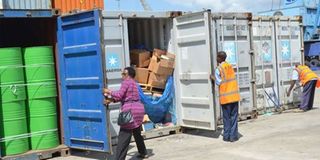Fear of job losses after rise in import duty at Mombasa

Port workers open abandoned containers for public viewing of unclaimed goods ahead of a planned auction. Goods worth millions of shillings are lying at the port due to a sharp increase in import levies. PHOTO|DAILY NATION
What you need to know:
- There are fears of job losses as many clearing and forwarding agents say they can no longer afford to release goods at the port, with the delays having a cost impact on importers through demurrage charges, hence lowered income.
Mombasa. A duty increase on imported goods has caused a clearance clog at the Port of Mombasa, with more than 1,000 containers piling up uncollected. This is after the Kenya Revenue Authority (KRA) increased tariffs three months ago.
There are fears of job losses as many clearing and forwarding agents say they can no longer afford to release goods at the port, with the delays having a cost impact on importers through demurrage charges, hence lowered income.
According to the Kenya International Freight and Warehousing Association, Mombasa branch secretary, Mr Bernard Simiyu, KRA introduced tariffs in August.
Following this, the duty on imported goods jumped from $200 (Ksh20,000) per tonne to $580 (Ksh58,000), overburdening many clearing and forwarding agents.
He said the increased tariffs affected commodities such as rice, tyres, batteries, powdered milk and linen.
As a result, clearing and forwarding agents were unable to clear 1,200 containers from the port, said Mr Simiyu. He added that due to the high cost of doing business, some clearing and forwarding firms had laid off 2,000 workers.
The official warned that more 3,000 jobs could be lost if the government does not address the issue of high taxes. He added that efforts to seek audience with KRA commissioner general John Njiraini to discuss the matter had proved futile.
Addressing journalists at the association’s offices in Mombasa, Mr Simiyu asked the government to review the tax increase, noting that clearing and forwarding agents might stop lodging entries to clear cargo at the port.
“The agents can no longer afford to clear imported goods, owing to the high tariffs,” he said. Mr Simiyu noted that cargo worth millions of shillings was lying at the port and container freight stations while importation of new cargo was on the decline.
“We are not opposed to paying taxes, but we must be involved in decision making with regard to imposition of new tariffs,” he added.




